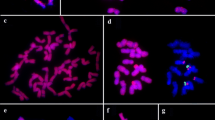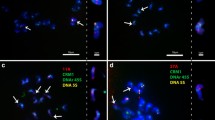Abstract
The genus Oryza to which cultivated rice belongs has 24 species (2n = 24 or 48), representing seven genomes (AA, BB, CC, EE, FF, BBCC and CCDD). The genomic constitution of five of these species is unknown. These five species have been grouped into two species complexes, the tetraploid ridleyi complex (O. ridleyi, O.␣longiglumis) and the diploid meyeriana complex (O.␣granulata, O. meyeriana, O. indandamanica). To evaluate the genomic structure of these species in terms of divergence at the molecular level vis-à-vis other known genomes of Oryza, we used the total genomic DNA hybridization approach. Total genomic DNA (after restriction digestion) of 79 accessions of 23 Oryza species, 6 related genera, 5 outgroup taxa (2 monocots, 3 dicots) and 6 F1s and BC1s derived from crosses of O.␣sativa with wild species were hybridized individually with 32P-labeled total genomic DNA from 12 Oryza species: O. ridleyi, O. longiglumis, O. granulata, O.␣meyeriana, O. brachyantha, O. punctata, O. officinalis, O. eichingeri, O. alta, O. latifolia, O. australiensis, and O.␣sativa. The labeled genomic DNAs representing the ridleyi and meyeriana complexes cross-hybridized best to all the accessions of their respective species, less to those representing other genomes of Oryza and related genera, and least to outgroup taxa. In general, the hybridization differential measured in terms of signal intensities was >50-fold under conditions that permit detection of 70–75% homologous sequences, both in the presence and in the absence of O. sativa DNA as competitor. In contrast, when total DNAs representing other Oryza genomes were used as probes, species of the O.␣ridleyi and O.␣meyeriana complexes did not show any significant cross-hybridization (<5%). These results demonstrate that the genome(s) of both of these complexes are highly diverged and distinct from all other known genomes of Oryza. We, therefore, propose new genomic designations for these two species complexes: GG for the diploid O. meyeriana complex and HHJJ for the allotetraploid O. ridleyi complex. The results also suggest that the uniqueness of these genomes is not restricted to species-specific highly repetitive DNA sequences, but also applies to dispersed sequences present in single or low to moderate copy numbers. Furthermore these appear to share relatively more genome-specific repeat sequences between themselves than with other genomes of rice. The study also demonstrates the potential of total genomic DNA hybridization as a simple but powerful tool, complementary to existing approaches, for ascertaining the genomic makeup of an organism.
Similar content being viewed by others
Author information
Authors and Affiliations
Additional information
Received: 26 July 1996 / Accepted: 17 September 1996
Rights and permissions
About this article
Cite this article
Aggarwal, R., Brar, D. & Khush, G. Two new genomes in the Oryza complex identified on the basis of molecular divergence analysis using total genomic DNA hybridization. Mol Gen Genet 254, 1–12 (1997). https://doi.org/10.1007/s004380050384
Issue Date:
DOI: https://doi.org/10.1007/s004380050384




